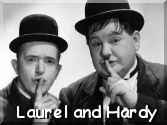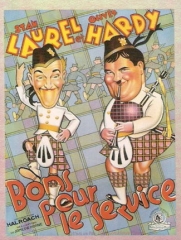STAN
(2006 - British Television)With Jim Norton, Trevor Cooper, Nik Howden, Mike Goodenough, Dearbhla Molloy, Lorelei King, Marton Marquez
Directed by Jon Sen
Reviewed by JB and JL

I am of two minds about STAN. On the one hand, it is a rewarding, emotional and extremely well-played story of a friendship in its final hours, the tale of a comedy team that lasted so long, it took the death of one member to break it apart. On that level, it works wonderfully, and viewers who only know Laurel and Hardy as a movie duo but are not familiar with the actual details of their lives will probably have no problem accepting this film as is.
On the other hand, as my friend Mr. Larrabee will later say in his review, inaccuracies abound. I don't mind the telescoping of events, a necessity borne from the need to fit so much into a one-hour film. What bothers me is that the writer obviously knew his Laurel and Hardy history and chose to change some of it rather pointlessly. Who else but a Laurel and Hardy fan would use a reference to "Doughboy", a horse mentioned in the Frank Capra film RIDING HIGH in which Oliver "Babe" Hardy made a rare solo cameo without his partner? I even had to look this obscure reference up in Glenn Mitchell's indispensable Laurel and Hardy Encyclopedia to confirm it. But to know the team's history and then disregard so much of it was an unfortunate choice. I am fairly certain that Babe Hardy was neither surprised nor perturbed at Stan Laurel getting a higher paycheck than he. Babe was well-aware, and highly grateful, that his partner did most of the behind the scenes work, spending long hours writing gags and editing footage, and fully believed Stan deserved every dollar extra he received. Yet in the film, it is portrayed as a shock, the news delivered along with a backhand insult by Laurel, simply to force a dramatic moment in the script. Similarly, Laurel is shown as wanting to continue making some unnamed film, obviously one of their last efforts for 20th Century Fox, while in real life, Stan was terribly unhappy and couldn't wait until the team's contract with Fox was up. And the dramatic conceit of the older Stan Laurel refusing to see his friend Mr. Hardy for months simply is not true. The fact is that Stan had his own health problems, but when Babe Hardy became incapacitated in 1956, Stan asked the real life Mrs. Hardy to keep him informed of Babe's lucid periods so that he could go visit his dear friend at those times.
So as a film about the final days of an old comedy team, STAN is a high-quality drama. As the story of Laurel and Hardy, it has problems. None of those problems can be blamed on any of the four men who play two separate sets of Laurel and Hardy. If both Jim Norton (older Stan) and Nik Howden (younger Stan) come off as a bit too arrogant, they are only playing it the way it was written, and they play it well. Norton is particularly touching as an aging man whose life's work revolved around his screen partner and who is now almost literally scared to death of seeing both his friend, his entire career and soon his own life come to an end. Trevor Cooper, limited to using only gestures, grunts and eye movements, gives perhaps the film's best performance as the dying Mr. Hardy . His resemblance to the real Hardy is eerily uncanny, as is Norton's to the real Laurel, and there are times when I actually felt I was in the room keeping vigil at Babe Hardy's deathbed - quite a chilling feeling. Nick Howden and Mike Goodenough also do fine jobs as the younger Laurel and Hardy in their prime, although their attempts at recreating Stan and Ollie's comic magic fall rather flat.
In real life, Stan Laurel and Babe Hardy were two men who like each
other, respected the hell out of each other's unique talents and became
best friends as the years rolled by. STAN tells part
of the story, and features several scenes which will make true fans
reach for a box of tissues. It is just a shame that the
film's
defects - a short running time and some questionable dramatic license -
keep it from being the bio-pic that Laurel and Hardy truly deserve.
I am happy for any little tribute to Laurel and Hardy, and
enjoy
this film very much. Yet I am saddened that it will give a
false
impression of the real Stan Laurel to Laurel and Hardy novices.  ½ -
JB
½ -
JB
 A very well-made and
well-acted little film (although the all-British cast lapsed in an out
of their American accents from time to time) - poignant and sad, yet
uplifting in its way. Complete historical accuracy may be beside the
point in such a film, but I need to resolve a few matters in my head
before proceeding with a review.
A very well-made and
well-acted little film (although the all-British cast lapsed in an out
of their American accents from time to time) - poignant and sad, yet
uplifting in its way. Complete historical accuracy may be beside the
point in such a film, but I need to resolve a few matters in my head
before proceeding with a review.
I have no objection to condensing events for the sake of an hour-long film, if in doing so an accurate picture is presented. The "contract scene" in Roach's office, for instance, combined events from 1929, 1932, and 1938, but I can accept that as an expedient way to depict L&H's relationship with Roach (post-BABES IN TOYLAND anyway). That's the sort of historical inaccuracy I can accept.
But what I question are such
matters as
the notion that Stan wanted a solo career at the time L&H
became a team. My understanding of the events (with author Randy
Skretvedt as my main
source) is that Stan, who had resigned himself to a career as a writer
and gag man, was reluctantly coaxed back into performing when Babe had
that cooking accident. Some of the films they made together before the
official teaming had Stan in supporting roles, so it's not as if he was
on the path to re-igniting the solo career he had begun in the early
'20s. They worked together so often that teaming just seemed to be the
logical next step, with thanks to Leo McCarey for noticing that.
I know Stan was reluctant to
work as a
team, but I don't think his objections had anything to do with any
solo-career desires. I always had the impression that he was ambivalent
about performing in general by that time. So while it may be fair to
say that he didn't want to be a member of a team, I don't think it was
for the reasons depicted in the film. Maybe this was a shortcut way of
depicting Stan's big ego, but it leaves L&H newbies with the
impression that Stan longed for a solo career.

Stan could be a
cold-hearted bastard, but why create the impression that he was the
sort of guy who'd walk out on his wife right after their infant son
died? He and Lois didn't divorce until four years after that happened,
and there are pictures of Big Lois and Little Lois visiting the film
sets during those four years. It might have been a rocky period for
them, but they didn't divorce or separate after the family
tragedy.
Then there was the business of how they developed the act. We are led to believe that two guys who had already made about 20 films together, and who had worked as a team in several of those films, suddenly couldn't figure out how to be funny together when Roach imposed the partnership on them. We're also told that Babe was the one who inspired and conceived the most important aspects of their act. "We're a team like Ruth and Gehrig...All for one, one for all!...If we played characters that anyone could look down upon...How about if they adopt a baby..." and so on. Despite that scene in Roach's office where Stan boasts of his accomplishments to justify his salary, the film strongly suggests that Babe was Stan's creative equal, even the main inspiration and motivating factor behind the team.
But I reason that all of the above was done to make the writer's point more clearly and directly. Stan was man who failed at relationships with everyone in his life except the one man he needed to make him personally and professionally whole. For everything that went wrong with his marriages or career, Babe was there to provide the balance he needed. Even at the end, Babe provided just what he needed: one last big laugh. Laurel and Hardy always found the absurdity and comedy within tragedy (it's Babe who finds the comedy in the loss of Stan's son, something Lois can't provide), and Stan couldn't let go until their partnership ended in that way, with a true L&H moment. With that, Stan is able to put his past away in the cupboard (while always retaining the fond memories), open the curtains and let the world in.
Maybe the inaccuracies succeed in painting an accurate picture of who the man was overall. The writing, the performances, the dramatic structure, the flashbacks -- everything is first rate. I also liked that they kept the re-creations of the on-screen Stan and Ollie to a minimum. Nobody can recreate the magic of their comedy, so I appreciated that the film focused on their personal lives. But I'm torn as to what extent I should rap the film for some of the above-mentioned matters. Inaccuracies are one thing, it's the unfair inaccuracies that I have to ponder.
Hmmm, come to think of it, I
may have just written my review right there.  - JL
- JL
Laurel and Hardy The Age of Comedy
HERE'S ANOTHER NICE QUOTE:
"See, when you're here, all my comic thoughts - and that's most of my thoughts - they have meaning. When you're gone, they'll just be the dreams of an old man who has too much time on his hands."


